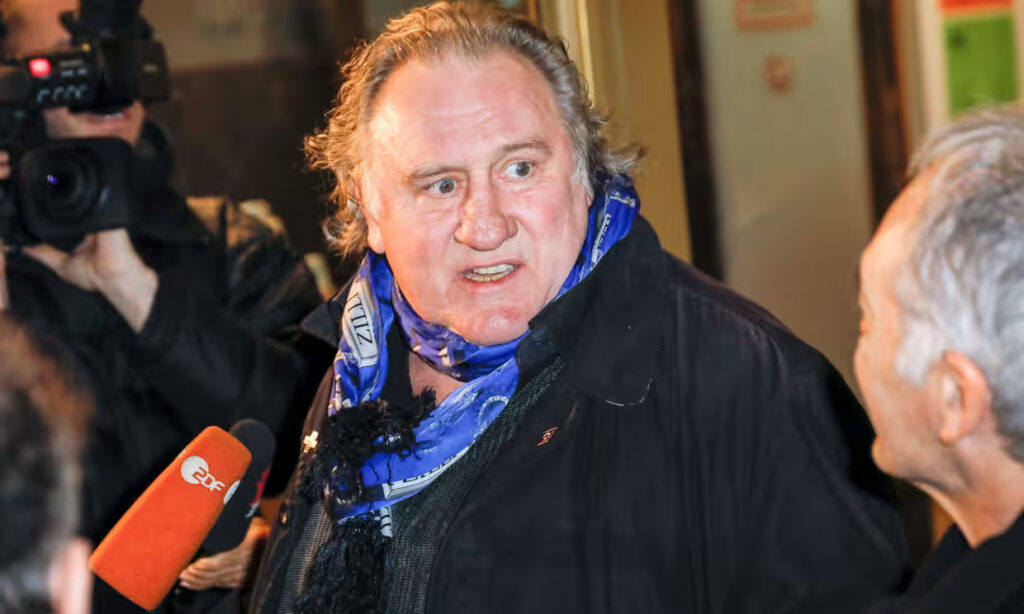Figures in the French film and TV industry have said they would not work again with the actor Gérard Depardieu, after a documentary showed footage of sexism and inappropriate behaviour by the star, who is under formal investigation for rape.
The documentary, Depardieu: The Fall of an Ogre, ran on the public service channel France 2 on Thursday night, after more than a dozen women had previously made allegations of sexually inappropriate behaviour against Depardieu in an investigation by Mediapart last year.
The documentary showed footage of Depardieu on a trip to North Korea in 2018 to mark the secretive state’s 70th anniversary. The actor, who had travelled to Pyongyang with a TV crew and knew he was being filmed, made obscene comments to women, and about women, repeatedly sexually harassed a female translator and made sexual comments about a child at an equestrian centre whom he saw riding a horse. On Friday, the footage was described by the leftwing member of the European parliament Manon Aubry as “vile”.
Fabien Onteniente, who directed the film Disco with Depardieu in 2007, said he would never work with the actor again after watching the documentary in which the actor Hélène Darras alleged that she was assaulted by Depardieu on the set of the film. “It’s not in my values, it’s not possible to close your eyes to this type of unacceptable behaviour,” Oniniente told FranceInfo news channel. He said there was a type of omertà in the French film industry on sexual violence, because it was a kind of closed shop with “lots of denial”.
Darras described how Depardieu “looked at me like a bit of meat” and asked her if she wanted to go to his dressing room. She said no. But she alleges he then assaulted her on set, grabbing her body. She said she was petrified and no one on set reacted. She said she did not speak out at the time because she did not want to be “blacklisted at the age of 26”. After speaking to the documentary-makers in September, she filed an official police complaint against Depardieu.
It is understood that investigators are studying Darras’s complaint, to see if it falls under a time limit or whether formal action could be taken against Depardieu.
In a recorded phone call included in the documentary, Depardieu said he would not comment on the contents of the programme.
The documentary also interviewed the actor Charlotte Arnould, who went to the police five years ago, accusing Depardieu of rape and sexual assault on two occasions at his home in Paris in 2018, when she was 22 and Depardieu, a friend of her father, was 70. Depardieu was placed under formal investigation for alleged rape and sexual assault in the case in December 2020. Depardieu’s lawyers have denied all allegations against him.
Arnould told the documentary that she had been anorexic at the time of the alleged attack and it had been “absolute horror”.
In an open letter to Le Figaro in October, Depardieu denied all allegations, saying any encounter with Arnould had been consensual. He said he was the victim of a lynching orchestrated by a “media court”, and wrote: “Never, ever have I abused a woman.”
Depardieu, one of France’s most famous actors, has appeared in more than 170 films and gained international fame with English-language roles. Despite being placed under formal investigation for rape, he has continued to work prolifically in French cinema in recent years. But he faced protests outside several singing gigs across France earlier this year, with women shouting “shame” and holding banners against sexual violence.
In Thursday’s documentary, the actor Sarah Brooks, who appeared in a TV series with Depardieu in 2015, alleged that one day, while the actors were standing for a photo, he had repeatedly forced his hand into her shorts, despite her repeatedly pushing him off. When she protested to those TV crew around her that Depardieu had put his hands in her shorts, she claims the star replied: “I thought you wanted to succeed in cinema,” and everyone laughed.
Manuel Alduy, the head of cinema and international development for the public broadcaster, France Télévisions, told the documentary that he had paused any projects with Depardieu. “We must not celebrate Gérard Depardieu, it’s just not possible,” he said.
Marc Missonnier, head of France’s film producer union, said of Depardieu’s behaviour towards women in the film industry: “There was a tolerance and that was a mistake.”
Jean-Louis Livi, who was Depardieu’s agent for decades, told the documentary the star was an institution of French cinema. “I know Gérard Depardieu. He is neither a rapist nor a predator. He’s a monster, yes, but he’s also a sacred monster. He’s a monument.”
Source : The Guardian


